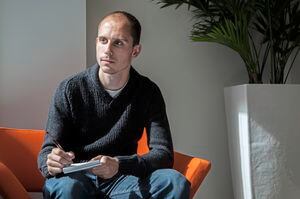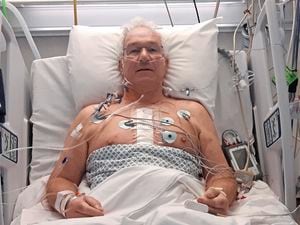Write around the globe
TO SAY that 26-year-old Kieran Guilbert has been ‘busy’ in recent years would be a major understatement. He has interviewed the President of Niger, written on Ebola in Liberia and lived in Senegalese villages for several weeks to document economic migration of young men to Europe. Now back on UK soil, Kieran leads the Thomson Reuuters Foundation’s coverage of modern-day slavery and human trafficking in addition to his editing responsibilities.

After completing his A-levels at the Grammar School and graduating from his journalism and French degree from the University of Sheffield in 2013, Kieran joined the foundation as a London-based reporter in 2014 before moving to Senegal in October 2015.
Writing and the need to tell stories has been integral to Kieran’s identity for as long as he can remember.
‘I knew from a young age that I wanted to be a writer, ideally a novelist, but my parents said journalism might provide a little more stability – and they were probably right.
‘As a teenager, I sought out work experience in various newsrooms, from the Guernsey Press to the Press Association and the Irish Times, and I was hooked straight away, it was such a rush.’
A ‘second language, strong work ethic, desire to learn and challenge myself and a sense of adventure’ all helped him get to where he is today, he says.
His new role back in the UK after two ‘incredible years’ in Senegal is a far cry from his working life in Dakar.
‘I just moved back to London – my flight got in at 10pm on a Sunday night and I started my new role at 8am the next day, talk about no rest for the wicked. I’m staying with my cousin in West Ham while I search for my own place, which is proving very stressful and a far cry from flat-hunting in Dakar, where references, contracts, deposits and admin fees don’t really exist.
‘Senegal was such a warm, welcoming and wonderful place to call home. I had the privilege of reporting on humanitarian issues across about 10 countries, from post-Ebola recovery in Liberia and the Boko Haram insurgency in Nigeria to refugee crises in Cameroon and Niger and the economic migration of young men from Senegal to Europe.’
Kieran now helps to manage a team of about 45 journalists and dozens of stringers worldwide, covering issues including women’s rights, climate change and land rights.
‘It’s been a complete shift in responsibilities. In Senegal, I only focused on West Africa as my patch, and was largely left to my own devices to cover the stories I deemed most newsworthy. I would be looking for several short, spot stories each week while meeting contacts for coffees – or sometimes cocktails – and constantly planning my next reporting trip in the region.’
Kieran says he can ‘barely keep count’ of the many highlights he experienced working and travelling around West Africa.
‘I had the honour of interviewing the President of Niger, hearing inspirational stories of people rebuilding their lives and businesses in Liberia after Ebola, and living in Senegalese villages for several weeks to document the economic migration of young men to Europe. I listened, learned and laughed a lot, saw some stunning sunsets and made good friends along the way.
‘On the flip side, I also had some pretty harrowing and unpleasant experiences, which stick in my mind. I was threatened by sex traffickers in Senegal while trying to speak to the women under their control, encountered young children in hospital whose limbs were blown off after being hit by an air strike in north-east Nigeria, and was briefly detained by the Mauritanian government because they don’t really like journalists.’
In his new role, Kieran helps direct the foundation’s coverage from all corners of the globe and makes sure they have their finger on the pulse and are ‘proactive rather than just reactive when it comes to the big stories’.
‘I am always following as much news as possible, scouting out various sources to see how we can put our own spin or a deeper analysis of the big stories of the day or week, such as the recent #MeToo campaign.
‘On an average day, I’ll be having planning meetings with our reporters in headquarters, be on the phone to discuss ideas with our foreign correspondents, and working on my own investigations and features about modern slavery – whether it is about sex traffickers using listings websites to sell children, men forced to work in car washes for no pay or foreign domestic workers trapped in the homes of their abusive employers.
He says he loves the ‘pace, dynamism and intensity of working in a major newsroom’.
‘It’s a bit of a cliché, but in journalism, no two days at work are ever the same. I really enjoy the juggling act of covering big, breaking stories on a daily basis while also working on longer-term and long-form pieces.
‘The main challenge is ensuring we always stay on the ball and that nothing passes us by, while also trying to put our own fresh angle on major developments and trends.’
For any aspiring journalists out there, Kieran has a few pieces of advice up his sleeve.
‘First of all, try to read a wide variety of proper, quality journalism every day and write as often as possible – whether it’s jotting down thoughts and experiences in a notebook, keeping a blog or sharing insightful or witty observations on social media.
‘Second, seek out your niche or area of interest or expertise, build up ideas and contacts, and try to make a name for yourself in that field.
‘Lastly, be prepared to roll up your sleeves, put in long days and toil away until you get your first break, or your foot in the door somewhere. Don’t be afraid to nag news organisations and editors for a chance.’
The future certainly looks bright for this young journo from the Rock, and he has a few exciting projects on the horizon too.
‘I am very excited to be working on a series about the links between technology, human trafficking and modern slavery, which will involve multimedia reporting from countries including India, Vietnam, The Philippines, and the United States, among others. I also have a few investigative stories on the go.
‘On a personal level, I would love to get my rusty Spanish up to scratch and spend a year or two freelancing across South America. Career-wise, I’d love to one day test myself as a journalist properly in a major conflict; say Syria, South Sudan or Yemen for example.
‘And then maybe one day… focus on that book that I’ve always wanted to write since I was a kid.’





